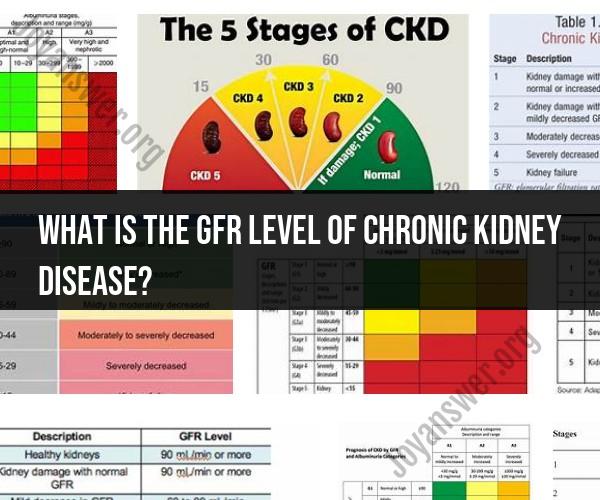What is the GFR level of chronic kidney disease?
Decoding GFR Levels in Chronic Kidney Disease: What You Need to Know
Chronic Kidney Disease (CKD) is a progressive condition that affects the kidneys' ability to function properly over time. One crucial parameter used to assess kidney function is the Glomerular Filtration Rate (GFR). Understanding GFR levels is essential for diagnosing and managing CKD effectively. This article aims to demystify GFR levels and their significance in the context of chronic kidney disease.
What is GFR?
Glomerular Filtration Rate (GFR) is a measurement that reflects how well the kidneys are filtering waste and excess fluid from the blood. The glomeruli, which are tiny blood vessels in the kidneys, play a pivotal role in this filtration process. A GFR test estimates the amount of blood that passes through the glomeruli per minute, usually measured in milliliters per minute (mL/min). This measurement helps healthcare professionals assess kidney function and stage the severity of CKD.
GFR Levels and Stages of CKD
GFR levels are categorized into stages to help healthcare providers gauge the progression of CKD and guide appropriate management strategies. The stages are typically defined as follows:
Stage 1: GFR > 90 mL/min: Kidney damage with normal or high GFR. Early stages may not present noticeable symptoms, but underlying kidney issues can still be identified through tests.
Stage 2: GFR 60-89 mL/min: Mild reduction in kidney function. Like stage 1, symptoms might be absent or subtle, but medical attention is crucial.
Stage 3a: GFR 45-59 mL/min: Mild to moderate reduction in kidney function. Symptoms may start becoming noticeable, and complications could arise.
Stage 3b: GFR 30-44 mL/min: Moderate to severe reduction in kidney function. Medical intervention and lifestyle changes become even more critical.
Stage 4: GFR 15-29 mL/min: Severe reduction in kidney function. Preparing for advanced kidney care, including potential dialysis or transplant, is crucial.
Stage 5: GFR < 15 mL/min: Kidney failure. Dialysis or kidney transplant becomes necessary for survival.
Interpreting GFR Levels
It's important to note that GFR levels are influenced by factors like age, gender, muscle mass, and underlying health conditions. In addition, GFR is often estimated using equations that take into account serum creatinine levels, age, gender, and race. These equations, such as the Modification of Diet in Renal Disease (MDRD) equation or the Chronic Kidney Disease Epidemiology Collaboration (CKD-EPI) equation, provide a more accurate picture of kidney function than serum creatinine levels alone.
Why GFR Matters
Monitoring GFR levels is vital for several reasons:
Early Detection: CKD is often asymptomatic in its early stages. GFR testing helps catch kidney issues before they progress to advanced stages.
Treatment Planning: Knowing the GFR stage allows healthcare providers to develop appropriate treatment plans tailored to the severity of CKD.
Risk Assessment: GFR levels indicate the risk of complications such as cardiovascular disease and electrolyte imbalances, which are common in advanced CKD.
Medication Adjustment: Medications, especially those cleared by the kidneys, might need dosage adjustments based on GFR levels to prevent toxicity.
Dialysis or Transplant Evaluation: GFR below 15 mL/min indicates the need for dialysis or kidney transplant to sustain life.
Conclusion
Decoding GFR levels is crucial for understanding the status of kidney function and managing chronic kidney disease effectively. Regular monitoring, lifestyle adjustments, and medical interventions guided by GFR levels can slow down the progression of CKD, improve quality of life, and prevent complications. If you have concerns about your kidney health, consult a healthcare professional for appropriate testing and personalized guidance.












